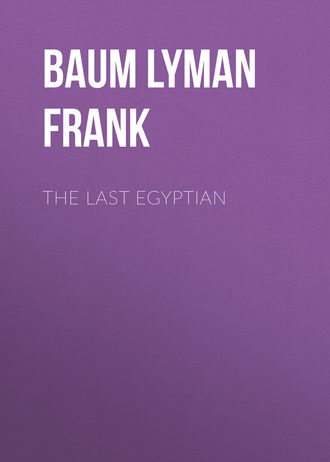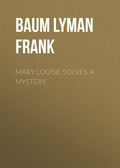
Лаймен Фрэнк Баум
The Last Egyptian
CHAPTER VI
KĀRA BATHES IN THE NILE
Tadros followed him into the street again.
“Those other papyri,” he said – “do you wish me to sell them for you?”
“They are already sold,” replied Kāra, regardless of truth.
“Indeed! To whom?”
“Winston Bey, the Englishman.”
Tadros uttered an exclamation of annoyance.
“Where have you met him?” he asked.
“Here, at the Nile landing. His boat will come to-night for the papyrus rolls.”
Many thoughts passed rapidly through the dragoman’s mind. Here was bad news, indeed. He had planned on getting all those wonderful rolls into his own hands, and his disappointment was keen to find that this isolated Egyptian of an out-of-the-way rock village had already been approached and bought up by one of those rascally scientists, before he, the clever dragoman, had even known of the existence of the treasures.
“He will rob you,” he ventured to suggest.
“Very well,” replied Kāra, indifferently.
Tadros was in despair. Yet one thing was plainly evident – if Winston Bey was about to unload fourteen newly found rolls of papyrus upon the directors of the museum in Cairo, it would be well for him, the dragoman, to get his one roll in first, at the highest possible price. That could easily be accomplished. Winston’s dahabeah would consume four or five days on the downward voyage. Tadros could cross the Nile in a small boat and catch the railway on the other bank, which would land him in Cairo the next day. He promptly decided to take the railway.
“I expect,” said Kāra, “to be in Cairo myself shortly. If you are there, I would like to hire your services as dragoman.”
Tadros, aroused from his meditations, gave a start, and wonderingly examined the speaker from his dirty bare feet all the way up his soiled burnous to his strong, calm face and faded turban. He had been a native of Fedah himself, and had known “the royal one,” as he scornfully called Kāra, from boyhood. Until now he had regarded him as a permanent fixture of the little village; a listless, lazy do-nothing, supported in some mysterious way by his grandmother and destined to grow old amid his solitary surroundings.
Some slight importance Kāra had doubtless acquired through his inheritance of the papyri; but that he should think of visiting Cairo and employing the brilliantly appareled dragoman was a marvel that fairly astounded Tadros. Yet, why not? He would have money. Tadros could assuredly teach him how to spend it. Kāra might become an incident in his career – an element in his future prosperity.
“Call upon me at any time,” he said, condescendingly. “You shall have the advantage of my experience and knowledge of the world.”
“That is what I want,” returned the Egyptian, “and I will pay you liberally for it.”
He passed into his dwelling, and the dragoman, watching him go, decided to make speedy preparation for his own departure.
He felt much easier in his mind than at first. What if Winston Bey purchased the papyrus rolls? Would not Tadros be the young man’s guide? Very good. Very good, indeed!
Kāra lay down again and slept until after noon. Then he went to the hut of Nefert, who baked the bread for the village, and bargained with her for a loaf and a bowl of milk. Also he acquired from her a large, coarse sack. In exchange he gave her Hatatcha’s water jar, which had come from Keneh, and an old scarf his grandmother had worn over her head.
He ate the loaf and drank the milk, feeling much refreshed. Then he carried the sack to his dwelling and placed the papyrus rolls in it.
From the secret cavity beside the arch he took the bronze vase with the metal stopper, a scarab ring that his grandmother had sometimes worn, and a slender dagger with a steel blade. The bronze dagger that served as a key to the rock door he left in the cavity, as well as the lamp.
Having replaced the stone, he glanced around to see whether there was anything that might be disturbed or stolen during his absence; but the room was bare of anything to tempt a thief or a despoiler. So he swung the sack over his shoulder and walked out and around the end of the mountain on his way to the Nile.
Winston Bey had kept his word. On the chance that the strange Egyptian he had encountered would manage to secure either valuable information or some ancient relics from his mysterious grandmother, he had kept his dahabeah in the neighborhood, ignoring the protests of his unhappy Arab crew. The afternoon following his interview with Kāra, he landed near the group of palms an hour before sunset, and waited until darkness fell without obtaining a sight of the Egyptian. Then he dropped down the stream to Tel El Armana, where the dahabeah remained until the next noon.
To-day he figured on another disappointment; but when Gerald Winston had an object in view he pursued it with dogged determination, and he had resolved to keep his appointment each day for a week at least before considering his future actions. There was no question but he was on the track of an important discovery, and he did not intend to abandon the quest lightly.
On this second day, therefore, when he approached the grove and saw a white-robed figure sitting in the shade, his heart gave a joyful bound. He hurried forward and recognized Kāra, who remained motionless until the Englishman had saluted him. Then he bowed his head gravely.
Winston’s eyes were on the sack that rested beside the Egyptian, and his voice sounded eager in spite of his effort to restrain it.
“Well, my brother?” he exclaimed.
“My grandmother, Hatatcha, is dead,” said Kāra.
The Englishman shrank back in horror.
“You have killed her?”
“Oh, no; not at all,” answered the other composedly. “She was dying when I returned home after my conversation with you. It would not pay me to kill Hatatcha, you know.”
“What did you learn from her?”
“Nothing. She was beyond questioning. But she whispered that I should seek under the rushes of her bed for my inheritance, and then Anubis took her to his kingdom. Her secret, if she had one, she carried with her.”
Winston was deeply chagrined. He reproached himself for not having interviewed the old woman in person and endeavored to wrest her secret from her. Now, alas, it was too late!
“What have you in the sack?” he inquired, almost indifferently.
“My inheritance,” said Kāra.
“Of what does it consist?”
“I have fourteen rolls of ancient papyrus manuscript.”
“Fourteen rolls?” cried Winston, trembling with sudden excitement. “Let me see them, man – let me see them!”
Kāra did not move.
“I am going to Cairo,” said he. “Will you take me with you in your boat?”
“Yes; to be sure. Come to the boat at once.”
“That is better,” declared the Egyptian. “You can then examine the papyri at your leisure and determine whether they are of interest to you.”
He slowly arose to his feet and swung the sack across his shoulder. Winston eagerly preceded him. The stifling heat was all forgotten. Hatatcha’s unfortunate death was forgotten. A treasure had been unearthed at last, and surely from fourteen manuscripts much important information might be gleaned.
On the deck of his dahabeah he glanced at the papyri with amazement. Each one was perfectly preserved and unrolled without danger of breaking.
“Their condition is extraordinary!” he observed. “Where, did you say, you found them?”
“In a hollow of earth, covered by the rushes of Hatatcha’s couch.”
Winston raised his head to look at the speaker closely.
“Then they have not been there long, I am sure.”
“That,” said Kāra, with a shrug, “is a matter of which I have no knowledge.”
The scientist carefully unrolled a manuscript.
“This,” he said, musingly, “is a poem by the poet Pen-ta-urt. And it is a composition I have never seen before.”
He began reading it, and soon Kāra corrected him in a passage and explained how he should properly translate it. Winston’s eyes sparkled. This Egyptian really knew the hieroglyphics better than he did. His assistance might be invaluable in some ways. Perhaps the man would prove as remarkable a find as the manuscripts.
The next writing was an address to his soldiers by Amenhotep III, on the eve of his invasion of Syria. It was beautifully executed, and would prove a valuable addition to the literature of the fifteenth century before Christ.
Far into the night Winston pored over the writings, finding in some veritable treasures and in others little of worth save for their age and beauty of execution. Still, as a collection, the fourteen rolls constituted a remarkable library of ancient literature, and its fortunate discoverer slept but little on that eventful night.
Before daybreak the dahabeah was wheezing and puffing down stream on its way to Cairo, and Kāra, who had slept well extended upon the deck, was given a breakfast such as he had never before tasted. The fragrant coffee was a revelation to him, and the chops and fruit made his eyes sparkle; yet so sedate was the Egyptian’s demeanor that Winston was unaware that his guest had never before eaten a properly prepared meal.
The Englishman’s satisfaction this morning was so great that he also bestowed upon Kāra one of his choicest cigars, and again the Egyptian tasted a luxury hitherto unknown to him.
While they were quietly enjoying their smoke Winston said:
“Will you sell me the rolls?”
“Yes,” replied Kāra.
“I will give you a thousand Egyptian pounds for them. That, you know, is about a hundred thousand piastres.”
Kāra made a mental calculation and frowned darkly.
“Perhaps it is not enough,” added Winston, quickly; “but on the other hand it may be too much altogether. Until I have examined the writings with more care I cannot value them accurately.”
“I will accept your offer,” said the Egyptian, still frowning. “I am sure it is fair, and even liberal. What annoys me is that I have made a fool of myself.”
“In what way?”
“I purchased a girl yesterday, and paid three times what she is worth.”
Winston smiled.
“Do not let it bother you,” he said, in an amused tone. “Few women are worth what they cost, believe me, and where their sex is concerned men are often fools.”
“My brother’s speech is wise,” returned the grave Kāra. “I will conceal my annoyance, for some day I may be indemnified.”
“Had Hatatcha any of the coins of Darius Hystaspes left?” inquired Winston, after a moment’s thought.
“Here are seven,” said the other, producing them.
The Englishman was delighted.
“I will pay you five pounds each for these,” said he.
“Then they are yours,” declared Kāra.
Afterward he showed the Englishman the bronze vase, which also changed hands at a liberal purchase price.
“And is this all?” asked Winston.
“It is all,” said Kāra.
“You will be rich, my brother. Here are ten pounds in English gold to seal our bargain. After we arrive in Cairo I will take you to my banker and transfer to your account the entire amount due you. You may draw then upon the bank as you require your money, in any sums that suit your convenience – so long as it lasts.”
“I thank you,” replied the Egyptian.
As they proceeded down the river, Kāra noted the spotless tunics and trousers of the Arabs, who one and all regarded “the dirty Copt” with open contempt. He also examined intently the Englishman’s dress. When the boat tied up at Assyut to allow Winston to visit a friend who was convalescent at the excellent hospital maintained there, Kāra walked through the bazaars, and returned to the dahabeah bearing several bulky packages.
That night he bathed in the river while the others all lay asleep. Afterward he stealthily transferred the contents of his turban to a chamois bag, which he fastened around his neck. Then he flung the old burnous and the turban overboard.
In the morning they found the Egyptian transformed. He wore an English shirt, with collar and necktie all of white, loose linen trousers that were gathered at the ankles in Arab style, and over these a flowing white burnous of spotless purity. Upon his head was a red fez; upon his feet red slippers from Algiers; about his neck hung the massive chain of the kings; upon his finger was his grandmother’s ring set with the scarab of Ahtka-Rā.
Winston was astonished, and gazed upon the Egyptian with approval. Then his eye caught the chain, and he uttered an exclamation of wonder.
“Where did you get it?” he asked, clutching at the chain to examine one of its exquisitely engraved links.
“It is also a part of my inheritance, but an heirloom that I dare not part with,” returned Kāra. “It is the record of the kings, my ancestors, from Mēnēs to Ahtka-Rā,” and he explained the meaning of the chain to Winston, and assisted him to decipher some of the inscriptions upon the heavy links.
“But this is a priceless treasure!” exclaimed the savant, filled with unbounded amazement at what he beheld.
“It is proof of my contention that I am of royal blood,” answered the other, proudly. “While I live I will not be separated from it.”
“You are right,” agreed Winston, promptly; and from that moment he entertained a new respect for this humble descendant of the ancient rulers of Egypt.
Not one of the manuscripts mentioned Ahtka-Rā; but the chain had at its end the link of that astute leader of men, and his identity was thus established beyond a doubt. The scarab, of unquestionable antiquity, was likewise a proof that Kāra’s ancestor was a descendant of kings. Immediately the young Egyptian became a person of consequence.
Kāra now smoked cigarettes, having purchased several boxes at Assyut. This was the most satisfactory luxury that attended his new condition, and conspired, more than anything else, to render him pleased with his lot.
The dahabeah arrived in Cairo on the morning of the fourth day.
Winston at once took a carriage and drove Kāra to the bank, where he placed the sum agreed upon to the young Egyptian’s credit. Kāra, who wrote English in a clear and delicate hand, was given a cheque book and registered his signature as follows: “Prince Kāra.”
“Residence?” inquired the banker.
“I have just arrived, and am not yet located,” was the answer. “To-morrow I will send you my address.”
“Let me also know where you are to be found,” said Winston, “for I must introduce you to the Egyptologists here.”
Then he left his new acquaintance to drive post haste to the museum, there to show his new-found treasures to his many friends.
CHAPTER VII
A STEP TOWARD THE GOAL
Kāra wandered about the streets. Cairo is a marvel to the most blasé traveler; it could not fail to impress an inexperienced native. But the Egyptian masked the astonishment under an expression cold and reserved and a manner dignified and undemonstrative. No one must suspect he was fresh from the desert and the Nile country. The shops of the jewelers especially attracted his attention, and he stopped many times to examine the splendid gems displayed in the windows. Some were priced, and he wondered at their value. It is said that no capital in the world contains so many rare and costly gems as Cairo.
In the evening he crossed the great bridge of Isma’il Pasha to the island of Gizireh, staring at the procession of carriages, camels, automobiles and donkeys that at twilight followed on one another’s heels. In the carriages and automobiles rode Syrians, Turks, Copts and Arabs, clothed in conventional European dress, save for the red fez everywhere prevalent. The burnous and native dress had been abandoned by these aristocrats, and this met with Kāra’s full approval. He was not averse to innovations upon the ancient customs in which he had been reared. If the dominant people of his country and age were English, then the manners and customs of the English should be adopted by those who wished to compete with them in importance.
Also he began to understand that it is more dignified to ride than to walk. At Gizireh he hailed a carriage and in it returned across the bridge, avoiding the dust and heat and mingling with a procession of beautifully costumed women and handsomely dressed men. His own costume was poor enough in comparison, but his magnificent chain drew the eye of more than one curious observer.
And now Cairo was ablaze with lights, and the population seemed gathered upon the sidewalks before the cafés and restaurants. Kāra discovered that he was hungry. He dismissed his carriage and seated himself at one of the outdoor tables, ordering liberal refreshment. Opposite him sat a young English girl with a vacant-faced man for escort. Kāra, as he ate, examined this girl critically, for she was the first of her class he had seen at close range. Her dress was dainty and beautiful; but she was not fat at all. She was vivacious, and talked and laughed with unrestrained liberty. She seemed to imagine herself on an equality with the man beside her, who, despite his inanity, was still a man. Altogether, Kāra was disappointed in her, although his grandmother had warned him that the training of European women imbued them with peculiar ideas, to which he must defer in his association with them.
As he watched the girl, Nephthys rose several degrees in Kāra’s estimation. Nephthys was certainly fat and soft of flesh, and she did not talk much. The possession of such a woman was quite desirable, and perhaps he had not paid an extravagant price for Nephthys after all. These independent, chattering Western women must be tolerated, however, until he had accomplished his mission; so it would be well to begin at once to study their ways.
Presently someone touched his shoulder familiarly, causing Kāra to shrink back with an indignant gesture. Tadros, the dragoman, stood smilingly beside him, more gorgeously arrayed than ever. Tadros was in an excellent humor. He had not been obliged to take his roll of papyrus to the museum for a market, but had disposed of it to a private collector for a price far exceeding his expectations, which had not been too modest. Altogether he had made an excellent trade, and there might be other pickings in this unsophisticated fellow-townsman of his, whose very presence in Cairo was warrant that he had money to part with.
Before accosting Kāra the dragoman had observed the change in his appearance and demeanor. The former recluse was no longer disgustingly filthy, but seemed clean in person and was gowned in a snowy and respectable burnous. The objectionable turban had given place to the fez; the red slippers were of excellent morocco. Best of all, the chain around his neck was rich and heavy and of remarkable workmanship. Kāra was not only presentable, but his manner was dignified and well bred.
All this indicated suddenly acquired wealth – that mysterious old Hatatcha must have left to her grandson much more than the papyrus rolls; and although Kāra might endeavor to be secret and uncommunicative, he was bound to betray himself before very long. Now was the heated term, and even gay Cairo was listless and enervated. The dragoman would have ample leisure to pick this bone skilfully before the tourist season arrived.
Kāra’s first angry exclamation was followed by a word of greeting. He was glad Tadros had found him, for as yet he had secured no place of residence, and the bigness of the city somewhat bewildered him in spite of his assumed reserve.
The dragoman agreed to take him to a respectable rooming-house much frequented by Copts of the better class. When they had arrived there, Kāra’s guide made a mystic sign to the proprietor, who promptly charged his new guest double the usual rate, and obtained it because the Egyptian was unaware he was being robbed. The room assigned him was a simply furnished, box-like affair; yet Kāra had never before occupied an apartment so luxurious. He examined the door with care and was pleased to find that it was supplied with a stout bolt as well as a lock and key.
“Now,” said the dragoman, “it is yet early; we have barely crossed the edge of the evening. I will take you to the theatre to see the dancing girls, and later to a house where they wager money upon a singular and interesting game of red and black. We can afterward eat our supper at a restaurant and listen to a fine band composed of Hungarian gypsies. How will that suit you?”
“Not at all,” replied Kāra, coldly. “I am going to bed. Be here to receive my orders at seven o’clock in the morning.”
Tadros fairly gasped with astonishment.
“Seven o’clock is too early,” he said, a little sullenly. “The city is asleep at that hour.”
“When does it awaken?”
“Well, the shops are open at about nine.”
“Come to me, then, at nine. Good night.”
This summary dismissal was a severe disappointment to the dragoman, yet he had no alternative but to take his leave. Strange that Kāra had refused the dancing girls and the game table; but perhaps he was really tired. Tadros must not expect too much from his innocent at first.
At nine o’clock the next morning he found that the young Egyptian had breakfasted and was impatiently awaiting him.
“Take me to the leading jeweler in town,” said Kāra.
The dragoman frowned, but presently brightened again and took his employer to a second-rate shop, where his commissions were assured.
“Not here,” said Kāra. “I have seen much better shops.”
Tadros tried again, but with no better success; so he altered his plans and took Kāra direct to Andalaft’s, trusting to luck to exact a commission afterward.
“Now, then,” said he, briskly, “what shall we examine first?”
But Kāra ignored him, asking to see the proprietor in private. Mr. Andalaft graciously consented to the interview, and when the Egyptian entered the great jeweler’s private room Tadros was left outside.
Kāra laid a splendid ruby upon the merchant’s table. The latter pounced upon it with an eager exclamation.
“It is very old,” said the Egyptian. “Tell me, sir, is there any one in Cairo who can recut it in the modern fashion?”
“But it will be a shame to alter this exquisite gem,” protested Andalaft. “It is the square, flat cutting of the ancients, and shows the stone to be absolutely pure and flawless. Such specimens are rare in these days. Let it alone.”
Kāra shook his head with positiveness.
“I must have it recut,” said he, “and by the best man obtainable.”
“Ah, that is Van der Veen, the Hollander. He does all my important work. But Van der Veen will himself argue against the desecration. He is a man of judgment.”
“Where can I find him?” asked the prince.
The merchant reflected.
“I will give you a letter to him,” said he. “If the stone must be recut, I want Van der Veen to do it himself. He has three sons who are all expert workmen, but no one in the world can excel the father.”
He wrote the note, addressed it, and gave it to Kāra. Then he again picked up the ruby and examined it.
“If you would but sell it,” he suggested, with hesitation, “I could secure for you a liberal price. The Khedive has placed with me an order for a necklace of the ancient Egyptian gems; but in two years I have been unable to secure more than three stones, none of which compare with this in size or beauty. Allow me.”
He opened a drawer and displayed the three antique stones – two emeralds and an amethyst. Kāra smiled, and putting his hand in a pocket underneath his burnous, he drew out five more rubies, but little inferior in size to the one he had first shown.
“Tell me,” said he, “what price you will pay for these, to add to the Khedive’s necklace.”
Andalaft was amazed, but concealed his joy and eagerness as much as possible. Carefully he examined the gems under a glass and then weighed each one in his scales.
“I will give you,” said he, after figuring a little, “four hundred pounds for the five stones.”
Kāra shrugged his shoulders and picked up the rubies.
“That may be the price for ordinary gems,” he remarked; “but their age and cutting give these an added value. I am holding them at eight hundred pounds.”
The merchant smiled.
“It is easy to understand,” said he, with politeness, “that you are a connoisseur of precious stones; but, because you love the antique, your partiality induces you to place an undue value upon your rubies. Come! let us say six hundred.”
“I will not bargain,” returned the Egyptian; “nor do I urge you to buy. If you cannot afford to pay my price I will keep the rubies,” and he made a motion to gather them up.
“Stay!” exclaimed the jeweler. “What does it matter? The Khedive wishes them, and I must make the sacrifice for his pleasure.”
With a hand he vainly endeavored to render steady he wrote a check for the sum demanded, and Kāra took it and went away. Andalaft had made an excellent bargain; yet the Egyptian, for all his cleverness, did not know that he had been victimized.
At the house of the diamond-cutter, on a quiet side street at the lower end of the Mouski, Kāra had a long interview with Van der Veen and his three sons. As a result they agreed, after examining the magnificent diamonds shown them, to devote their exclusive services to Prince Kāra for a full year, he promising to keep them busy with the work of recutting his collection of ancient gems.
Afterward he sent Tadros with notes to Gerald Winston and the banker, informing them of his temporary address, as he had promised. Then he had an excellent luncheon and smoked a Cuban cigar. In the afternoon he followed his imploring dragoman into several shops where he made simple purchases, and returned early to his hotel to find Winston impatiently awaiting him.
“You must accompany me at once to see my friend Professor Daressy, with whom I am already disputing concerning the new papyri. He is much interested in your method of interpreting the manuscripts, but requires a better proof of its accuracy than I can give him. Will you come?”
“It will give me pleasure,” answered Kāra – he drove with Winston to the curator’s house. His knowledge of the hieroglyphics was well founded, and he was not averse to an argument with the two savants. Indeed, they found his explanations so clear and concise that they were equally amazed and delighted.
The Egyptian dined with them in a private room, where the discussion could not be interrupted, and it was late in the evening when he returned thoughtfully to his own humble lodging.
“Tadros,” said he, “find me a comfortable house in a good part of the city. Something like that of Professor Daressy will do.”
“It will cost a lot of money,” objected the dragoman.
“Never mind; I will pay the price,” returned the prince, haughtily.
So the next day Tadros rented a furnished house near the Ezbekieh Gardens for twelve hundred piastres a month, and charged Kāra two thousand piastres for it. The prince moved in, and for three or four weeks devoted himself to watching the Van der Veens recut his treasures, to long conversations with those Egyptologists who were spending the heated term in Cairo, and to a study of the collection of ancient relics in the great museum which Maspero had founded under Said Pasha. Incidentally he observed the social life and manners of those with whom he came in contact, and acquired a polish of his own in a surprisingly short period.
At the end of the month he returned to Fedah, taking his dragoman with him. Tadros went without protest, for he was making excellent profits from his old-time friend and had perfected a system of robbery that almost doubled Prince Kāra’s expenses.
They traveled by train and crossed the river in a boat, arriving in the evening at the tiny village. Tadros carried Kāra’s large traveling case and walked behind him, as was fitting in a paid retainer.
And so they entered the narrow street of the village, where all the dozen or so inhabitants stood in their doorways to stare and nod gravely at their returned fellow-citizens.
Kāra bade his dragoman leave the luggage in his own dwelling and seek a lodging for himself with old Nefert or Amenka. He then walked on to where Sĕra and her daughter awaited him.
He pinched Nephthys’ fat cheeks, felt of her round bare arms, and finally kissed her lips, declaring that she was steadily improving in condition and would put to shame many of the women of Cairo.
Nephthys allowed the caresses listlessly, her eyes only brightening slightly when the gaily dressed dragoman came near and stood watching the proceedings. He wore a green jacket with gold embroidery to-day, and the girl observed it with evident approval.
“I sold her too cheaply, Kāra,” remarked the dragoman, stroking his thin mustache reflectively.
“In that I do not agree with you,” answered Kāra.
“I will pay double the price for her return,” said Tadros.
“The girl is not for sale. And see here, my man, keep your hands off her while you are in Fedah, or I will be obliged to kill you.”
“Never fear; I know my duties,” replied the dragoman, turning on his heel. It would not be wise to offend Kāra just now. The bone was not yet picked.
Nephthys put on her spangled gown and sat upon Kāra’s knee, while her mother brought cakes and milk for their refreshment. Kāra threw a chain of beads over the girl’s head, and she laughed for very pleasure. Sĕra felt of the beads and counted them. They were blue, and had cost five piastres, but the two women were delighted with them and would enjoy their possession for many days.
It was late when Kāra left Sĕra’s hut.
“In the winter,” said he, “I will doubtless come for the girl and take her to Cairo. Then you shall have the rest of your money. Meantime, here is backshish to console you.”
He gave her a piece of gold – the first she had ever possessed – and went away to his dwelling.
“Nephthys,” said the mother, “I am proud of you. You have made us both rich!”







